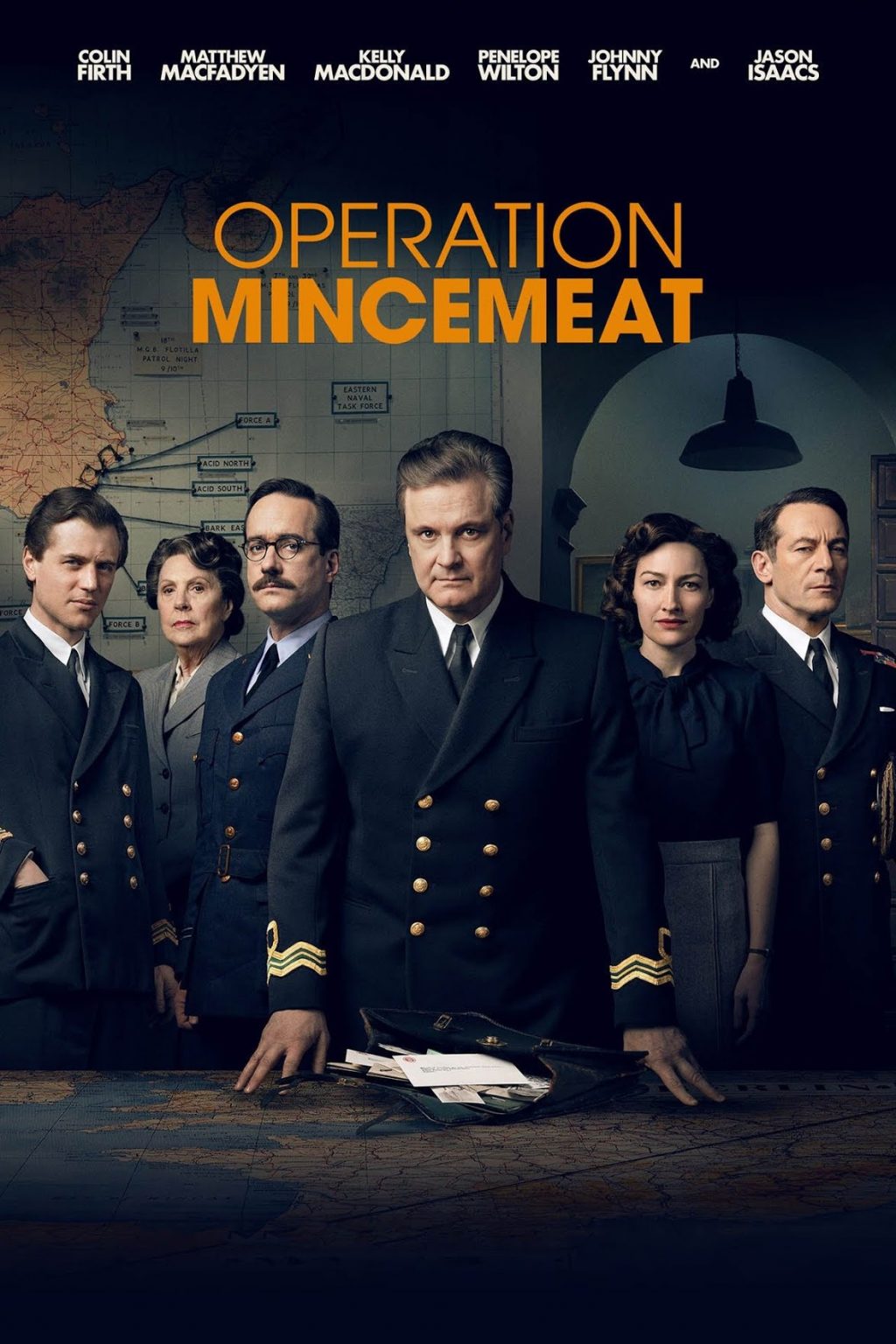After seeing the brilliant French wartime drama Farewell Mr Haffmann I was looking forward to more of the same with the British true story Operation Mincemeat. Regular readers will be familiar with my fondness for true stories and my mantra that the Brits do This Kind of Thing better than anyone but in this case I have to say the French film is superior.
Operation Mincemeat tells the true story of how the Brits used a corpse with a fake identity to fool the German high command into thinking the 1943 allied invasion of Europe would start in Greece rather than in Sicily which would have been the more obvious choice. Despite the many possible slips betwixt cup and lip, it worked. Even weeks after the allied landings had begun in Sicily, the Germans continued to prepare for an invasion of Greece. It’s said to have been the most successful wartime deception in history.
It’s a terrific story with many fascinating elements. They had to find a living man who resembled the dead one sufficiently that his photograph would pass muster as being the same person. They had to find a young woman willing to be photographed for the part of his fictitious fiancee, and they had to write convincing love letters to plant on him along with the photograph and faked-up correspondence between British Generals.
Colin Firth plays Captain Ewan Montagu, one of the British naval intelligence officers who ran the op. The other one was Lieutenant Charles Cholmondeley, played by Matthew McFadyen.
The idea had first cropped up in 1939 in a memo written by Naval Intelligence chief John Godfrey (played here by Jason Isaacs), and his personal assistant, Lieutenant Commander Ian Fleming, played by poet/actor/singer Johnny Flynn. (Google him – he’s got the most fascinating CV.) It’s long been part of wartime and Bond folklore that the whole crazy idea was Fleming’s invention.
And it was crazy. So many things could go wrong. Would the body – in reality that of a homeless alcoholic Welshman – wash up in the right spot? Would the Spaniards accept that ‘Captain Martin of the Royal Marines’ died by drowning and not from self-administered rat poison? Would they pass the material to the Germans? Would it actually get to Hitler’s desk? Would the papers still be legible after immersion in water? (This issue is raised in the movie but not answered! I’m still wondering how they did it.)
Would Cholmondeley’s bohemian, socialist-sympathising brother go blabbing to the Russians? And what should they tell the dead man’s sister, who came forward to claim her brother’s body just at the time they most needed secrecy?
For all this promising material, it’s surprising that the movie isn’t better.
One problem is the love story. It’s quite plausible that there was sexual rivalry between Cholmondeley and Montagu over Jean Leslie (Scottish actress Kelly Macdonald), the then 19-year-old MI5 agent who volunteered her image as the fiancée of the doomed Captain Martin. It must have been an irresistible temptation for Director John Madden (Shakespeare In Love, The Best Exotic Marigold Hotel) to put it in his version of the story, but you can’t just go round besmirching the reputations of real people, (Montagu was already married, Leslie married soon after) especially not people venerated for their war service, so we’re reduced to soulful gazes between the pretty lassie and Colin Firth doing his diffident Mr Darcy shtick and it’s all a bit maudlin and unconvincing and in the end slows the movie down.
It should have been less a speculative romance and more a wartime procedural. The plan was approved by both Churchill and Eisenhower, after all. Churchill does make an appearance (he’s played by Simon Russell Beale), and his presence is never wasted in a war movie, but more could have been made of this big picture stuff.
Three stars.
Post-movie googling
I was keen to learn more about the true story. The movie was roughly based on the 2010 book Operation Mincemeat, by Ben MacIntyre, who’s a dab hand at spy thrillers true or false.
He had plenty of sources for this oft-told story. The first version was told by British Cabinet Minister Duff Cooper in his 1950 book Operation Heartbreak.
Then came Montagu’s personal account of the affair – The Man Who Never Was, made into a movie of the same name in 1956. This was and remains the most notable version. At the time Montagu was restricted in what he could say about the role played by British signals intelligence, and in 1977 he published Beyond Top Secret U, his wartime autobiography which gave further details of Mincemeat.
These have all been added to my list of Books To Read Before I Die.
There have even been musical versions: one by a Welsh theatre company in 2015 and largely based on the life of Glyndwr Michael, which was the dead man’s name. Another musical version was staged in 2019 at the New Diorama Theatre, London.
One version that won’t be on my list is the 2008 book The Double Agents, by W. E. B. Griffin, which depicts Operation Mincemeat as an American operation. The cheek of it!


